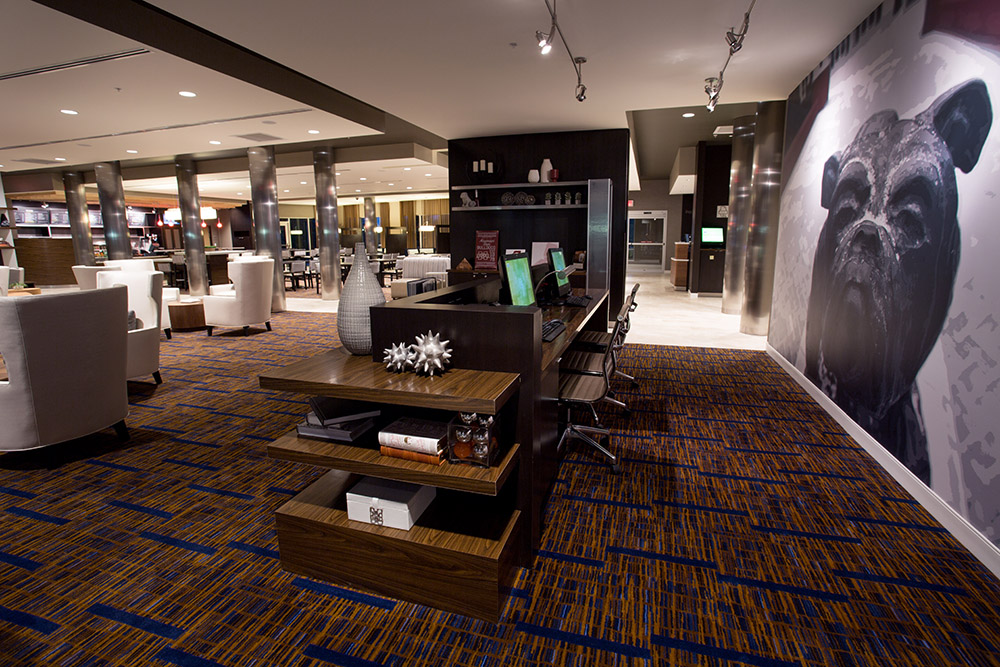Hotel restaurants often struggle to make a profit, but hotel bars can be consistent earners. Or can they?
Throughout the industry there has been a shift away from offering a traditional hotel bar in favor of a beer and wine bar. John Porior, president of independent hotel owner and operator WHG Companies, said beer and wine bars present a more cost-effective solution for operators, and also require them to have fewer items on hand. Aside from that, hotels opting for a beer and wine bar are able to avoid purchasing certain liquor licenses depending on the location of the property, and training for the bartender position is simplified, as well.
“The expectation would be that a full-service hotel would have a full bar, but a beer and wine bar can work in any property,” Porior said. “It matters based on your clientele and location. In some states like Kansas, a property can only carry beer unless they get a full liquor license, so in some cases it’s cost prohibitive, but that is an outlier.”
WHG operates a number of Cobblestone Hotels properties, and Porior said in those hotels the bar is attached to the front desk. By melding those positions (the front desk associate also provides limited food to guests on request), these properties are able to cut back even further on labor while still offering a number of amenities associated with hotel bars.
Shy Audience
Dan Puglisi, corporate director of F&B for the Peachtree Hotel Group, said setups like these are common throughout the extended-stay segment where guests are less likely to stick around public areas. Puglisi also said there has been an increase in self-service beer and wine dispensers in a number of properties, something that also assists with overhead.
While hotels may be able to cut down on labor by hiring employees willing to don multiple hats at the front desk, by extension the onboarding process is growing lengthier. Puglisi recommends a longer 60- to 90-day training period to help employees gain a full grasp of their position, matched with 30- to 45-minute online refresher courses on recipes and other aspects of the job. He also said Peachtree has been most successful hiring front-desk agents from outside of the hospitality industry because some new hires are less willing to check guests in while cutting fruit to garnish a drink.
“At every single one of our Hyatt Place and AC by Marriott properties, our front-desk agents are trained to the same standard as our bartenders,” Puglisi said. “Sometimes these staff members are also the cook, and they can go through the same training as cooks in order to provide that service to guests if it is needed.”

Pride Before the Fall
Adrian Kurre, global head of Home2 Suites by Hilton and Homewood Suites by Hilton, said it is often difficult convincing hotel operators to invest in either a smaller bar or no bar at all, often because it is a point of pride for them to be able to offer that amenity. However, Kurre said in many properties a bar simply doesn’t make sense.
“Nobody has ever sat around at home and asked their spouse, “Where do you want to eat tonight, the Homewood Suites?’” Kurre said. “Trying to staff a bartender isn’t always worth it.”
For Kurre to reach that conclusion, all it took was some simple math. If a hotel offers a traditional bar it must be staffed seven days per week, it must post its hours publicly in order to draw a crowd and it must adhere to those hours or regulars and locals won’t be incentivized to return. Unless the hotel is the only bar for miles, most markets are unable to sustain a position like this.
“Maybe in major markets like New York can you keep a bar open on every corner and still see action every night, but if your hotel is working that hard to rationalize having a bar, it’s not worth it,” Kurre said.
Kurre also touched on technology and the shrinking workforce, saying that hotels have an opportunity to succeed in this space where others failed primarily because of service. He cited “Player Piano,” a book written by Kurt Vonnegut depicting a post-employment society dominated by automation where one of the few remaining positions for employment were bartenders, simply because customers will always crave human interaction.
“Norm didn’t return to the bar in ‘Cheers’ every night for the drinks—he came back because everyone knew him,” Kurre said. “People go where they are recognized. I can’t prove statistically that travelers make buying decisions based on which properties offer a manager’s reception, but we as an industry haven’t been good at looking after the guest on a personal level to the degree that we should.”
